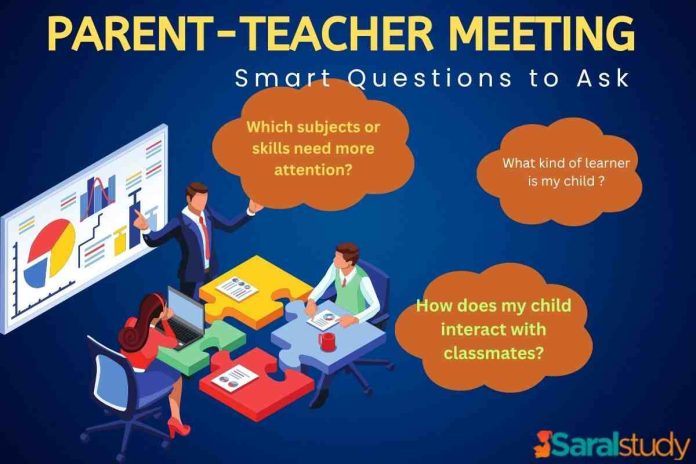Parent-Teacher Meetings (PTMs) are more than quick updates on marks — they’re a chance to build a real partnership between home and school.
A good Parent-Teacher Meeting conversation helps parents see beyond grades. It opens up insights about a child’s strengths, struggles, emotions and even hidden talents.
When parents participate actively, they don’t just track progress — they create a circle of support that helps their child feel confident and motivated.
Before the Parent-Teacher Meeting — How Parents Can Prepare
Most parents attend Parent-Teacher Meeting with the goal of listening to the teacher. But great PTMs start with preparation. A little planning helps you ask better questions and get meaningful answers.
- Review Your Child’s Work: Before the meeting, take time to look at your child’s notebooks, assignments and report cards. This gives you a clear idea of what’s going well and where your child might be struggling.
- Talk to Your Child First: Ask your child how they feel about school. Are there subjects they enjoy or fear? Are there any issues with friends or teachers? Their perspective will guide your questions during the PTM.
- Make a Short List: Write down 4–5 points you’d like to discuss . Topics like focus , handwriting , participation or discipline are great starting points . Having notes ensures you use the limited Parent-Teacher Meeting time wisely .
Essential Questions to Ask During Parent-Teacher Meeting
To participate actively in a parents teachers meeting, parents can discuss about:
Academic Progress
- How is my child performing compared to the class average?
- Which subjects or skills need more attention?
- Does my child complete homework on time and understand concepts clearly?
Learning Style and Engagement
- What kind of learner is my child — visual, auditory, or hands-on?
- Does my child participate in class discussions?
- Are there any areas they seem particularly interested or bored in?
Behavior and Social Skills
- How does my child interact with classmates?
- Do they show confidence, shyness or distraction?
- Are there any behavioral concerns we should address together?
Teacher’s Feedback and Collaboration
- What are my child’s biggest strengths?
- How can we work together to support their learning at home?
- Is there any program or school activity that could help them improve?
Questions About Emotional Well-being and Confidence
While academics matter, emotional health is equally important. A child who feels happy and supported learns better.
Emotional Awareness
- Does my child seem anxious, stressed or distracted in class?
- How does the school handle emotional or peer-related challenges?
Confidence Building
- What activities can help boost my child’s confidence?
- Are they willing to take part in group activities or competitions?
These questions show teachers that you care about more than just scores — you care about your child’s emotional and personal growth too.
Turning Feedback into Action
A productive Parent-Teacher Meeting doesn’t end with just listening — it ends with action.
- Set Realistic Goals: Together with the teacher, define small goals — like reading daily, improving handwriting, or focusing better in class. Simple, clear targets motivate children without overwhelming them.
- Create a Joint Plan: Ask how you can support learning at home. Teachers appreciate when parents follow up and it helps children stay consistent with their efforts.
After the PTM — Follow-Up Steps for Parents
- Talk to Your Child: Share what you discussed in a positive way. Avoid making it sound like a “report session.” Instead, say things like,
“Your teacher is proud of your efforts — let’s work together on what can get even better!”
This builds trust and motivation.
- Check Progress Regularly: Keep in touch with teachers via school apps, messages, or short meetings. Revisit goals every few weeks and appreciate small wins. A few kind words can boost a child’s confidence tremendously.
Common Mistakes Parents Should Avoid During PTM
Don’t Blame
PTMs are for collaboration, not confrontation. Avoid blaming teachers or your child — focus on solutions.
Don’t Rush
Even if the Parent-Teacher Meeting is short, stay calm and listen carefully. A respectful tone encourages open conversation.
Don’t Compare
Every child learns differently. Comparing your child with others can lower self-esteem and create unnecessary pressure.
Conclusion
A Parent-Teacher Meeting is more than a formality — it’s a bridge of trust between home and school.
When parents ask thoughtful questions, listen actively and follow up with care, they show their child that learning matters — not just grades, but growth.
The goal isn’t to be a “perfect” parent but an involved one — someone who listens, supports, and helps their child bloom both inside and outside the classroom.
Also Read: How to Recognize and Prevent Online Scams Targeting Kids
Study Smarter, Not Harder: Build Productive Habits That Stick





